Flink(五)Flink开发IDEA环境搭建与测试(2)【用IDEA开发实时程序--流式处理数据案例--WordcountStreaming】
Posted on 2020-08-30 13:50 MissRong 阅读(643) 评论(0) 收藏 举报Flink(五)Flink开发IDEA环境搭建与测试(2)
用IDEA开发实时程序--流式处理数据案例--WordcountStreaming
(1)Scala代码
|
import org.apache.flink.api.java.utils.ParameterTool import org.apache.flink.streaming.api.scala.StreamExecutionEnvironment import org.apache.flink.streaming.api.windowing.time.Time
object SocketWindowWordCountScala { def main(args: Array[String]) : Unit = { // 定义一个数据类型保存单词出现的次数 case class WordWithCount(word: String, count: Long) // port 表示需要连接的端口 val port: Int = try { ParameterTool.fromArgs(args).getInt("port") } catch { case e: Exception => { System.err.println("No port specified. Please run 'SocketWindowWordCount --port <port>'") return } } // 获取运行环境 val env: StreamExecutionEnvironment = StreamExecutionEnvironment.getExecutionEnvironment // 连接此socket获取输入数据 val text = env.socketTextStream("node21", port, '\n') //需要加上这一行隐式转换 否则在调用flatmap方法的时候会报错 import org.apache.flink.api.scala._ // 解析数据, 分组, 窗口化, 并且聚合求SUM val windowCounts = text .flatMap { w => w.split("\\s") } .map { w => WordWithCount(w, 1) } .keyBy("word") .timeWindow(Time.seconds(5), Time.seconds(1)) .sum("count") // 打印输出并设置使用一个并行度 windowCounts.print().setParallelism(1) env.execute("Socket Window WordCount") } } |
----自己操作----
Scala代码:
package WordCount
import org.apache.flink.streaming.api.scala._
import org.apache.flink.streaming.api.windowing.time.Time
/**
* @Author : ASUS and xinrong
* @Version : 2020/8/29
*
* 流式处理数据-WordCountStreaming
*/
object WordCountStreaming2 {
def main(args: Array[String]): Unit = {
//一、环境
val eonvironment=StreamExecutionEnvironment.getExecutionEnvironment;
//二、接入端口
val text= eonvironment.socketTextStream("192.168.212.111", 9000, '\n')
//三、分词
val windowCounts=text
.flatMap(w=>w.split(" "))
.map(w=>WordWithCounts(w,1L))//自定义类
.keyBy("word")
.timeWindow(Time.seconds(5), Time.seconds(1))
.sum("count")
//打印
windowCounts.print()
//执行
eonvironment.execute("Scala Window")
}
case class WordWithCounts(word:String,count:Long)
}
测试:
首先,使用nc命令启动一个本地监听,命令是:
[root@bigdata111 flink-1.6.2]# nc -l 9000
启动IDEA中的程序
输入数据-1:

观察-1:
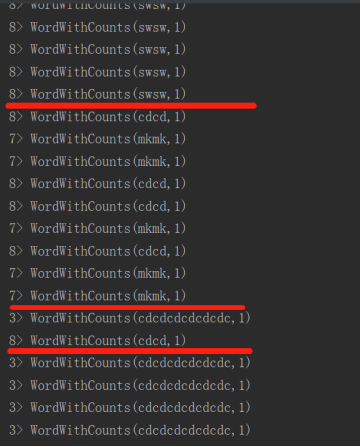
接着快速连着输入6个a:
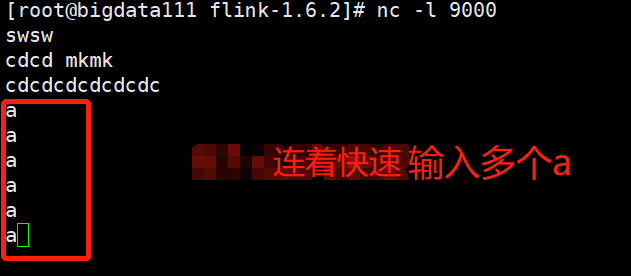
查看IDEA中结果:
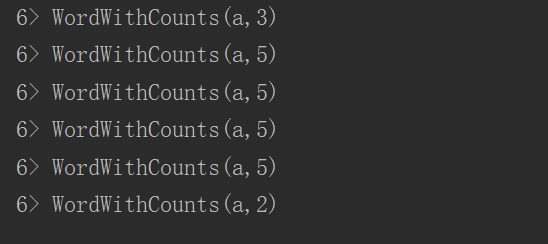
(2)Java代码
|
import org.apache.flink.api.common.functions.FlatMapFunction; import org.apache.flink.api.java.utils.ParameterTool; import org.apache.flink.streaming.api.datastream.DataStream; import org.apache.flink.streaming.api.datastream.DataStreamSource; import org.apache.flink.streaming.api.environment.StreamExecutionEnvironment; import org.apache.flink.streaming.api.windowing.time.Time; import org.apache.flink.util.Collector;
public class WordCount { //先在虚拟机上打开你的端口号 nc -l 9000 public static void main(String[] args) throws Exception { //定义socket的端口号 int port; try{ ParameterTool parameterTool = ParameterTool.fromArgs(args); port = parameterTool.getInt("port"); }catch (Exception e){ System.err.println("没有指定port参数,使用默认值9000"); port = 9000; }
//获取运行环境 StreamExecutionEnvironment env = StreamExecutionEnvironment.getExecutionEnvironment();
//连接socket获取输入的数据 DataStreamSource<String> text = env.socketTextStream("192.168.1.52", port, "\n");
//计算数据 DataStream<WordWithCount> windowCount = text.flatMap(new FlatMapFunction<String, WordWithCount>() { public void flatMap(String value, Collector<WordWithCount> out) throws Exception { String[] splits = value.split("\\s"); for (String word:splits) { out.collect(new WordWithCount(word,1L)); } } })//打平操作,把每行的单词转为<word,count>类型的数据 .keyBy("word")//针对相同的word数据进行分组 .timeWindow(Time.seconds(2),Time.seconds(1))//指定计算数据的窗口大小和滑动窗口大小 .sum("count");
//把数据打印到控制台 windowCount.print() .setParallelism(1);//使用一个并行度 //注意:因为flink是懒加载的,所以必须调用execute方法,上面的代码才会执行 env.execute("streaming word count");
}
/** * 主要为了存储单词以及单词出现的次数 */ public static class WordWithCount{ public String word; public long count; public WordWithCount(){} public WordWithCount(String word, long count) { this.word = word; this.count = count; }
@Override public String toString() { return "WordWithCount{" + "word='" + word + '\'' + ", count=" + count + '}'; } } } |
运行测试
首先,使用nc命令启动一个本地监听,命令是:
[itstar@node21 ~]$ nc -l 9000
启动监听如果报错:-bash: nc: command not found,请先安装nc,在线安装命令:yum -y install nc。
(通过netstat命令观察9000端口: netstat -anlp | grep 9000)
然后,IDEA上运行flink官方案例程序
node21上输入

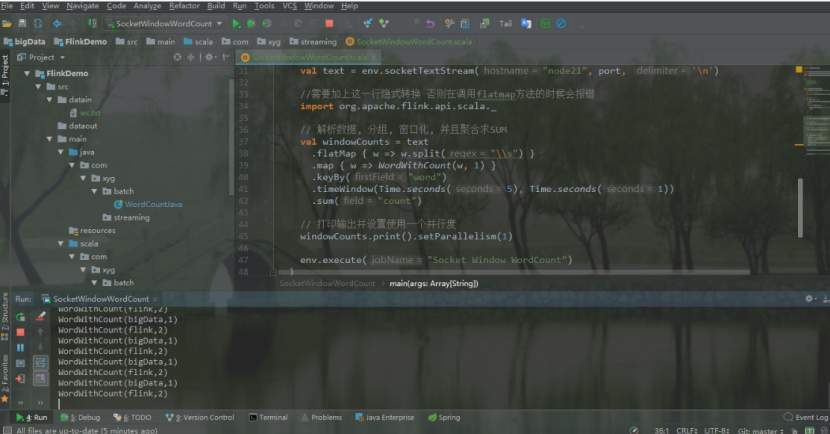
集群测试
这里单机测试官方案例
|
[itstar@node21 flink-1.6.1]$ pwd /opt/flink-1.6.1 [itstar@node21 flink-1.6.1]$ ./bin/start-cluster.sh Starting cluster. Starting standalonesession daemon on host node21. Starting taskexecutor daemon on host node21. [itstar@node21 flink-1.6.1]$ jps StandaloneSessionClusterEntrypoint TaskManagerRunner Jps [itstar@node21 flink-1.6.1]$ ./bin/flink run examples/streaming/SocketWindowWordCount.jar --port 9000 |
单词在5秒的时间窗口(处理时间,翻滚窗口)中计算并打印到stdout。监视TaskManager的输出文件并写入一些文本nc(输入在点击后逐行发送到Flink):

----自己操作----
Java代码:
package WordCount;
import org.apache.flink.api.common.functions.FlatMapFunction;
import org.apache.flink.streaming.api.datastream.DataStream;
import org.apache.flink.streaming.api.datastream.DataStreamSource;
import org.apache.flink.streaming.api.environment.StreamExecutionEnvironment;
import org.apache.flink.streaming.api.windowing.time.Time;
import org.apache.flink.util.Collector;
/**
* @Author : ASUS and xinrong
* @Version : 2020/8/29 & 1.0
*
* 流式处理数据-WordCountStreaming
*/
public class WordCountStreaming {
public static void main(String[] args) throws Exception {
//一、创建一个端口号
int port=9000;
//二、运行时的环境
StreamExecutionEnvironment env = StreamExecutionEnvironment.getExecutionEnvironment();
//三、创建Source
DataStreamSource<String> text = env.socketTextStream("192.168.212.111", port, '\n');
//四、转换数据-自定义结果数据类
DataStream<WordWithCount> windowCount = text.flatMap(new FlatMapFunction<String, WordWithCount>() {
@Override
public void flatMap(String line, Collector<WordWithCount> out) throws Exception {
for (String word : line.split(" ")) {
out.collect(new WordWithCount(word, 1L));
}
}
}).keyBy("word")
.timeWindow(Time.seconds(2), Time.seconds(1))//时间窗口(窗口大小,每次滑动的秒数)
.sum("count");
windowCount.print();
env.execute("Streaming word Count");//执行(添加名字)
}
/**
* 自定义结果类
*/
public static class WordWithCount {
public String word;
public Long count;
public WordWithCount() {
}
public WordWithCount(String word, Long count) {
this.word = word;
this.count = count;
}
@Override
public String toString() {
return "WordWithCount{" +
"word='" + word + '\'' +
", count=" + count +
'}';
}
}
}
测试:
首先,使用nc命令启动一个本地监听,命令是:
[root@bigdata111 flink-1.6.2]# nc -l 9000
启动监听如果报错:-bash: nc: command not found,请先安装nc
先虚拟机联网,然后执行yum -y install nc
nc是用来打开端口的工具
然后nc -l 9000
然后,IDEA上运行flink官方案例程序
bigdata111上输入:

IDEA上执行日可看到:
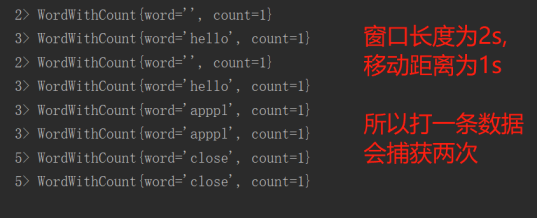


 浙公网安备 33010602011771号
浙公网安备 33010602011771号